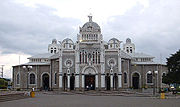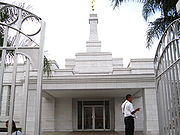
Religion in Costa Rica
Encyclopedia


Religion
Religion is a collection of cultural systems, belief systems, and worldviews that establishes symbols that relate humanity to spirituality and, sometimes, to moral values. Many religions have narratives, symbols, traditions and sacred histories that are intended to give meaning to life or to...
in Costa Rica
Costa Rica
Costa Rica , officially the Republic of Costa Rica is a multilingual, multiethnic and multicultural country in Central America, bordered by Nicaragua to the north, Panama to the southeast, the Pacific Ocean to the west and the Caribbean Sea to the east....
, conducted in 2007 by the University of Costa Rica
University of Costa Rica
The University of Costa Rica is a public university in the Republic of Costa Rica, in Central America. Its main campus, Ciudad Universitaria Rodrigo Facio, is located in San Pedro, in the province of San José. It is the oldest, largest, and most prestigious institution of higher learning in...
, found that 70.5 percent of the population identify themselves as Roman Catholics (with 44.9 percent practicing, 25.6 percent nonpracticing), 13.8 percent state they are Evangelical
Evangelicalism
Evangelicalism is a Protestant Christian movement which began in Great Britain in the 1730s and gained popularity in the United States during the series of Great Awakenings of the 18th and 19th century.Its key commitments are:...
Protestants, 11.3 percent report that they do not have a religion, and 4.3 percent declare that they belong to "another religion."
Apart from the dominant Catholic religion, there are several other religious groups in the country. Methodist, Lutheran, Episcopal
Anglicanism
Anglicanism is a tradition within Christianity comprising churches with historical connections to the Church of England or similar beliefs, worship and church structures. The word Anglican originates in ecclesia anglicana, a medieval Latin phrase dating to at least 1246 that means the English...
, Baptist
Baptist
Baptists comprise a group of Christian denominations and churches that subscribe to a doctrine that baptism should be performed only for professing believers , and that it must be done by immersion...
, and other Protestant groups have significant membership. The Church of Jesus Christ of Latter-day Saints (Mormons) claim more than 35,000 members and has a temple in San Jose
San José Costa Rica Temple
The San José Costa Rica Temple is the 87th operating temple of The Church of Jesus Christ of Latter-day Saints.The First Presidency of The Church of Jesus Christ of Latter-day Saints made an announcement on March 17, 1999 that a temple would be built in San José, Costa Rica...
that served as a regional worship center for Costa Rica, Panama, Nicaragua, and Honduras.. Although they represent less than 1 percent of the population, Jehovah's Witnesses
Jehovah's Witnesses
Jehovah's Witnesses is a millenarian restorationist Christian denomination with nontrinitarian beliefs distinct from mainstream Christianity. The religion reports worldwide membership of over 7 million adherents involved in evangelism, convention attendance of over 12 million, and annual...
have a strong presence on the Caribbean coast. Seventh-day Adventists operate a university that attracts students from throughout the Caribbean Basin. The Unification Church
Unification Church
The Unification Church is a new religious movement founded by Korean religious leader Sun Myung Moon. In 1954, the Unification Church was formally and legally established in Seoul, South Korea, as The Holy Spirit Association for the Unification of World Christianity . In 1994, Moon gave the church...
maintains its continental headquarters for Latin America in San Jose. Non-Christian religious groups, including followers of Judaism
Judaism
Judaism ) is the "religion, philosophy, and way of life" of the Jewish people...
, Islam
Islam
Islam . The most common are and . : Arabic pronunciation varies regionally. The first vowel ranges from ~~. The second vowel ranges from ~~~...
, Taoism
Taoism
Taoism refers to a philosophical or religious tradition in which the basic concept is to establish harmony with the Tao , which is the mechanism of everything that exists...
, Hare Krishna
International Society for Krishna Consciousness
The International Society for Krishna Consciousness , known colloquially as the Hare Krishna movement, is a Gaudiya Vaishnava religious organization. It was founded in 1966 in New York City by A.C. Bhaktivedanta Swami Prabhupada...
, Scientology
Scientology
Scientology is a body of beliefs and related practices created by science fiction and fantasy author L. Ron Hubbard , starting in 1952, as a successor to his earlier self-help system, Dianetics...
, Tenrikyo
Tenrikyo
Tenrikyo is a monotheistic religion originating in revelations to a 19th-century Japanese woman named Nakayama Miki, known as Oyasama by followers...
, and the Bahá'í Faith
Bahá'í Faith
The Bahá'í Faith is a monotheistic religion founded by Bahá'u'lláh in 19th-century Persia, emphasizing the spiritual unity of all humankind. There are an estimated five to six million Bahá'ís around the world in more than 200 countries and territories....
, claim membership throughout the country, with the majority of worshipers residing in the Central Valley (the area of the capital). While there is no general correlation between religion and ethnicity, indigenous peoples are more likely to practice animism
Animism
Animism refers to the belief that non-human entities are spiritual beings, or at least embody some kind of life-principle....
than other religions.
Article 75 of the Costa Rican Constitution states that the "Catholic, Apostolic, and Roman Religion is the official religion of the Republic". That same article provides for freedom of religion
Freedom of religion
Freedom of religion is a principle that supports the freedom of an individual or community, in public or private, to manifest religion or belief in teaching, practice, worship, and observance; the concept is generally recognized also to include the freedom to change religion or not to follow any...
, and the Government generally respects this right in practice. The US government found no reports of societal abuses or discrimination based on religious belief or practice in 2007.
Bahá'í Faith
The Bahá'í Faith in Costa Rica begins when `Abdu'l-Bahá`Abdu'l-Bahá
‘Abdu’l-Bahá , born ‘Abbás Effendí, was the eldest son of Bahá'u'lláh, the founder of the Bahá'í Faith. In 1892, `Abdu'l-Bahá was appointed in his father's will to be his successor and head of the Bahá'í Faith. `Abdu'l-Bahá was born in Tehran to an aristocratic family of the realm...
mentions it as one of the places Bahá'ís should take the religion to in 1919. The first pioneers
Pioneering (Bahá'í)
A pioneer is a volunteer Bahá'í who leaves his or her home to journey to another place for the purpose of teaching the Bahá'í Faith. The act of so moving is termed pioneering. Bahá'ís refrain from using the term "missionary"...
began to settle in Coast Rica in 1940. followed quickly by the first Bahá'í Local Spiritual Assembly being elected in San José
San José, Costa Rica
San José is the capital and largest city of Costa Rica. Located in the Central Valley, San José is the seat of national government, the focal point of political and economic activity, and the major transportation hub of this Central American nation.Founded in 1738 by order of Cabildo de León, San...
in April 1941. The National Spiritual Assembly was first elected in 1961. As of 2009 the national community includes various peoples and tribes and over 4,000 members organized groups in over 30 locations throughout the country.

